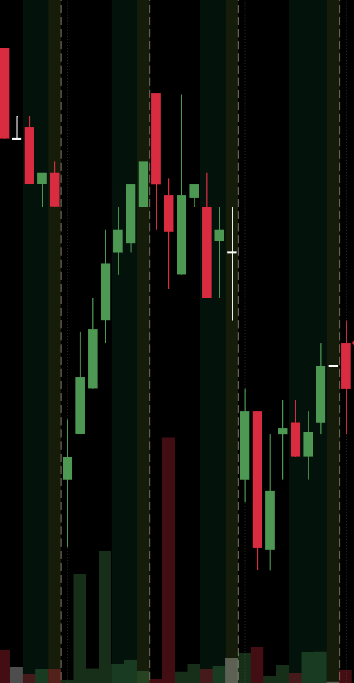Schedule Provider
The Schedule Provider is responsible for providing trading session breaks and extended hours data for the chart. It ensures accurate visualization of trading sessions, including pre-market, regular trading, after-market, and non-trading periods. This is essential for financial applications that require precise representation of market hours.
/// A protocol that provides session breaks and extended hours data for the chart.////// The `ScheduleProvider` is responsible for supplying trading session breaks and extended hours information,/// which are used to highlight specific time ranges on the chart (e.g., market open/close times, breaks, or after-hours trading).////// When integrating with `DXFeedFramework`, developers can either implement this protocol themselves or use the default implementation/// provided by the library. The provider is passed to the library via the `DataProviders` class.////// - Note: Proper implementation of this protocol ensures accurate visualization of trading sessions and extended hours on the chart.public protocol ScheduleProvider {/// Fetches the complete trading schedule for a specific instrument within a given time range.////// This method retrieves the full trading schedule, including session breaks and extended hours, for a specific instrument./// The data is returned as a `Trading.Schedule` object, which provides detailed information about trading sessions.////// - Parameters:/// - startTime: The start time of the requested range, in milliseconds since the Unix epoch./// - endTime: The end time of the requested range, in milliseconds since the Unix epoch./// - instrument: The financial instrument for which the trading schedule is requested./// - completion: A closure that is called with the result of the operation. The result contains either a `Trading.Schedule` or an `Error` if the request fails.func fetchTradingSchedule(startTime: Int64,endTime: Int64,instrument: Instrument,completion: @escaping (Result<Trading.Schedule, Error>) -> Void)}@available(*, deprecated, renamed: "ScheduleProvider", message: "This typealias is deprecated and will be removed in version 1.4.0. Use `ScheduleProvider` instead.")/// A deprecated typealias for `ScheduleProvider`.////// This typealias is provided for backward compatibility and will be removed in a future version./// Use `ScheduleProvider` directly instead.public typealias QDScheduleProtocol = ScheduleProvider
Trading.Schedule
Data struct for storing processed information about instrument's trading hours.
public extension Trading {/// Data struct for storing processed information about instrument's trading hours.////// Trading hours are split by sessions [Schedule.Day.TradingSession].////// Every session belongs to a day [Schedule.Day].////// Sessions can be of different types [Schedule.Session.SessionType].////// - Parameters:/// - name: Name of the instrument (e.g., "AAPL")./// - timeZone: Time zone identifier of the instrument./// - days: List of days [Schedule.Day].public struct Schedule: Codable {public let name: Stringpublic let timeZone: Stringpublic let days: [Day]public struct Day: Codable {public var id: Stringpublic var isHoliday: Boolpublic var isShort: Boolpublic var sessions: [Trading.Session]}}/// Data class for storing processed information about instrument's trading hours for a single day.////// Trading hours are split by sessions [Trading.Session].////// - Parameters:/// - id: ID of the day (e.g., "2021-11-08")./// - isHoliday: Is the day a holiday with no trading./// - isShort: Is the day a short day with shorter trading hours./// - sessions: List of sessions [Trading.Session].struct Session: Codable {public let startTime: Datepublic let endTime: Datepublic let type: SessionTypepublic enum SessionType: String, Codable {case noTrading = "NO_TRADING"case preMarket = "PRE_MARKET"case regular = "REGULAR"case afterMarket = "AFTER_MARKET"}}}
Extended hours are displayed on the chart as follows:
 \
\
Default provider
If you haven't implemented a Schedule provider earlier and are using DXFeedFramework to retrieve data.
Please contact your DXFeed sales manager or visit https://dxfeed.com/contact-sales/ for assistance.
Default implementation code:
import DXChartimport DXFeedFrameworkstruct DXFeedScheduleProvider: DXChart.ScheduleProvider {private let dataStorage = DataStorage.sharedfunc fetchTradingSchedule(startTime: Int64,endTime: Int64,instrument: Instrument,completion: @escaping (Result<Trading.Schedule, Error>) -> Void) {do {guard let tradingHours = dataStorage.tradingHours(symbol: instrument.symbol) else {completion(.failure(ServerError.noData))return}let schedule = try DXSchedule(scheduleDefinition: tradingHours)let startDay = try schedule.getDayByTime(time: startTime)let endDay = try schedule.getDayByTime(time: endTime)var days = [Trading.Schedule.Day]()for index in startDay.dayId...endDay.dayId {let day = try schedule.getDayById(day: index)let sessions: [Trading.Session] = day.sessions.compactMap {TradingSession(startTime: Date(timeIntervalSince1970: Double($0.startTime / 1000)),endTime: Date(timeIntervalSince1970: Double($0.endTime / 1000)),type: $0.type.sessionType)}let dxcDay = Trading.Schedule.Day(id: "(day.dayId)",isHoliday: day.holiday != 0,isShort: day.shortDay != 0,sessions: sessions)days.append(dxcDay)}let dxcSchedule = DXChart.Trading.Schedule(name: instrument.symbol,timeZone: instrument.timezone,days: days)completion(.success(dxcSchedule))} catch {completion(.failure(ServerError.unknown))osLogger.error("Error Fetching schedule: (error)")}}}private extension ScheduleSessionType {var sessionType: Trading.Session.SessionType {switch self {case .noTrading: .noTradingcase .preMarket: .preMarketcase .regular: .regularcase .afterMarket: .afterMarket@unknown default: fatalError()}}}